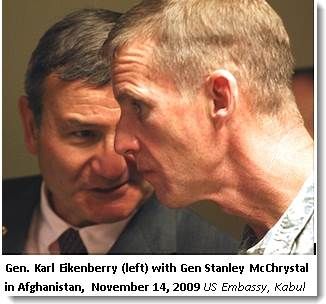| « Turkey Targets Press Freedom | New York Times v. Hugo Chavez » |
"I told you so..."
By Michael Collins

General Karl W. Eikenberry was right in November 2009 when he urged less support for an Afghanistan ruled by President Hamid Karzai. President Obama and Generals Stanley McChrystal and David Petraeus all wanted a surge. The policy failed. The general won't say it but he told them so in a second opinion solicited by Obama. Look at the facts. (Image)
The Bush administration hand-picked Hamid Karzai to be the first ruler of Afghanistan. Following the axiom, nothing good comes out of the Bush administration; is it any surprise that Karzai oscillated between less than effective and a near disaster? Lately, he's gone nonlinear.
On February 25, Karzai ordered United States Special Forces out of three provinces claiming that Afghan troops tied to the U.S. command were torturing their fellow citizens. As U.S. Secretary of Defense Chuck Hagel arrived in Kabul on March 11, Karzai accused the U.S. of "colluding with the Taliban." He added the odd notion that the Taliban sought a prolonged U.S. presence in Afghanistan.
Retired Army colonel David Maxwell of Georgetown University remarked: “I cannot see how we could work with such an apparently delusional leader much longer, but unfortunately I do not know if we have any other good options.” Bloomberg, Mar 11
It didn't have to be this way.
In late 2009, the Obama administration finalized its review of Afghanistan policy. There were two diametrically opposed choices. General Stanley McChrystal argued for a dramatic increase in troops, focusing on Special Forces. He assured the president that his plan would work given enough resources. Disgraced General David Petraeus leaked the McChrystal plan to put leverage on Obama, who was already in favor of a surge. The policy of a troop surge prevailed but there was another choice, one backed by experience and evidence.
General David Eikenberry, at the time, the U.S. Ambassador to Afghanistan, argued just the opposite in a cable to the president before the decision. He noted that Karzai lacked legitimacy with the people of Afghanistan. Popular support and a degree of public trust were the baseline requirements for any stabilization and successful U.S. withdrawal.
"WASHINGTON — The United States ambassador to Afghanistan, who once served as the top American military commander there, has expressed in writing his reservations about deploying additional troops to the country, three senior American officials said Wednesday.
"The position of the ambassador, Karl W. Eikenberry, puts him in stark opposition to the current American and NATO commander in Afghanistan, Gen. Stanley A. McChrystal, who has asked for 40,000 more troops." New York Times, Nov. 11
Eikenberry knew Karzai and he knew the election that brought him to power was rigged. He didn't figure this out after the fact. As U.S. Ambassador, Eikenberry went public demanding a clean election. He went so far as to appear with opposition candidate, Abdullah Abdullah, at campaign rallies where he called for a free and fair election. His clear message was not heeded. The first round of voting in August 2009 was so corrupt, candidate Abdullah pulled out of the final vote. There was no point, he said.
An unfair election denies the victor political legitimacy. The challenges facing Afghanistan required a legitimate leader (alternate link). The lack of legitimacy plus Karzai's sketchy past and associations meant ultimate failure for any U.S. effort.
Had the administration followed the general's advice, we would not be dealing with a delusional Karzai today.
Public servants like General Eikenberry represent the opportunity for real change. People of integrity and demonstrated courage need to be heard. When they have a record of achievement and firsthand knowledge of the facts on the ground, their advice should prevail. In this case, that process failed. The question remains. Will the administration learn the folly of endless wars?
END
This article may be reproduced with attribution of authorship and a link to this article.
How we got to Zero: General Eikenberry's Hail Mary by Michael Collins, November 12, 2009


